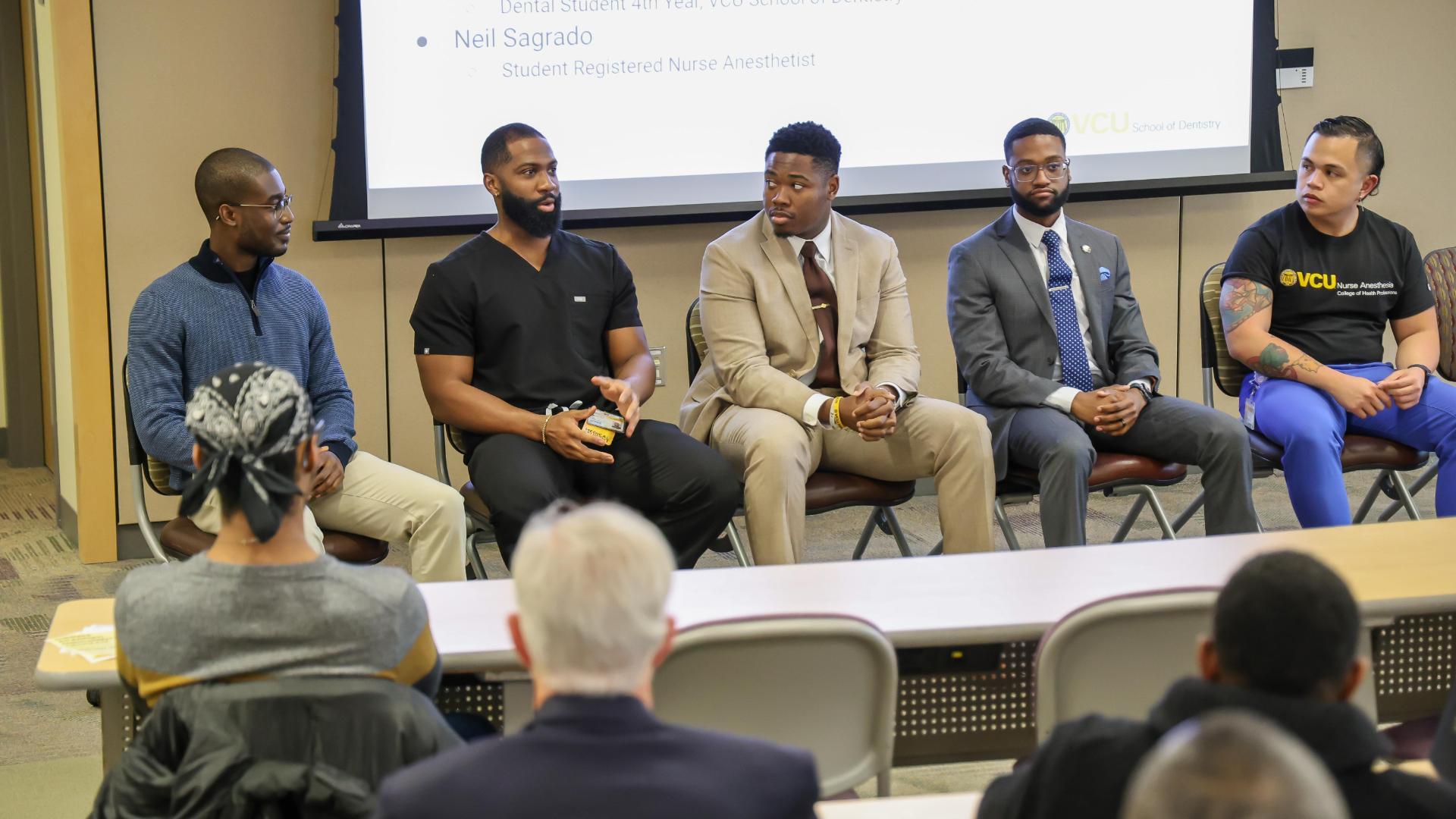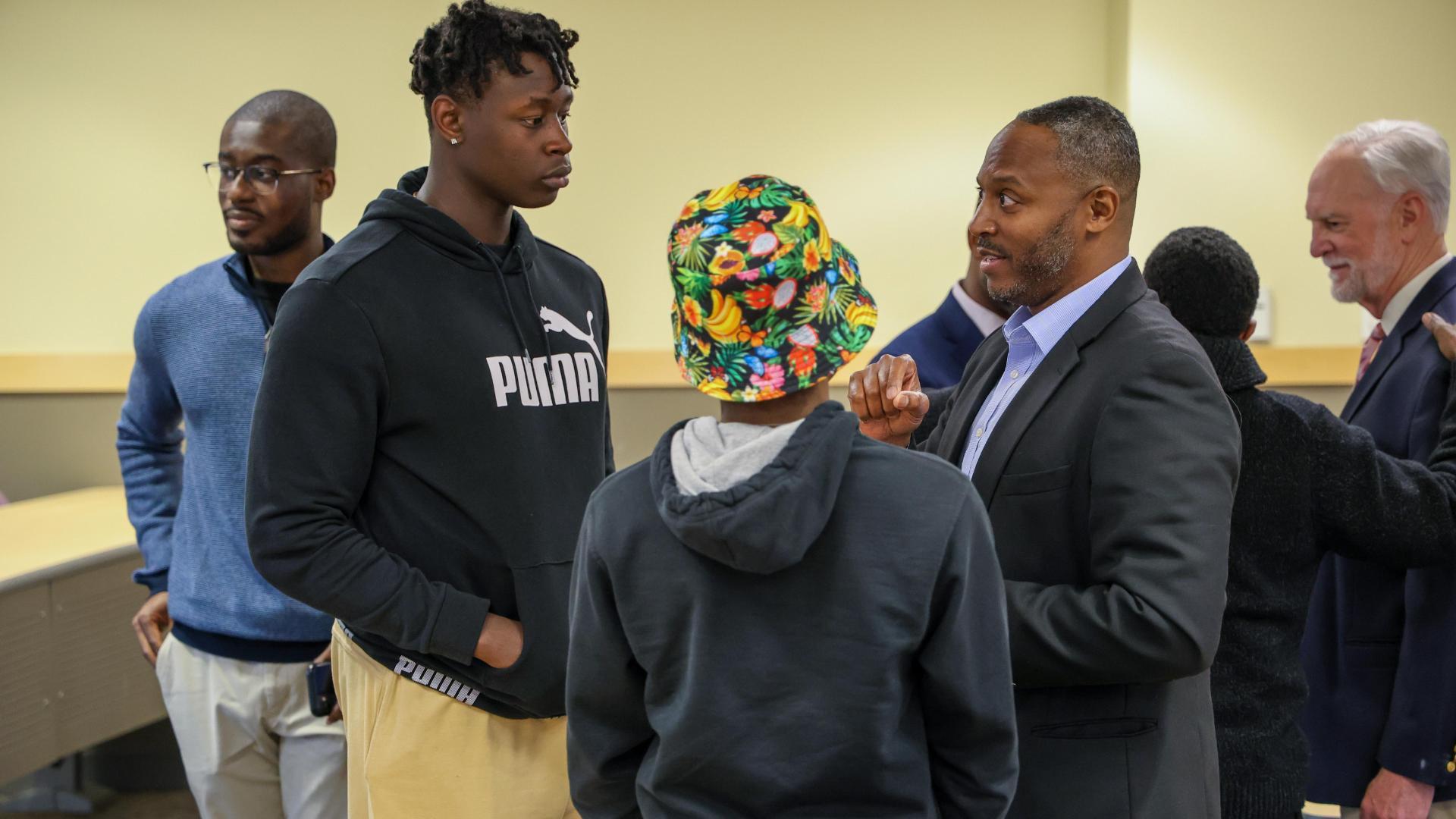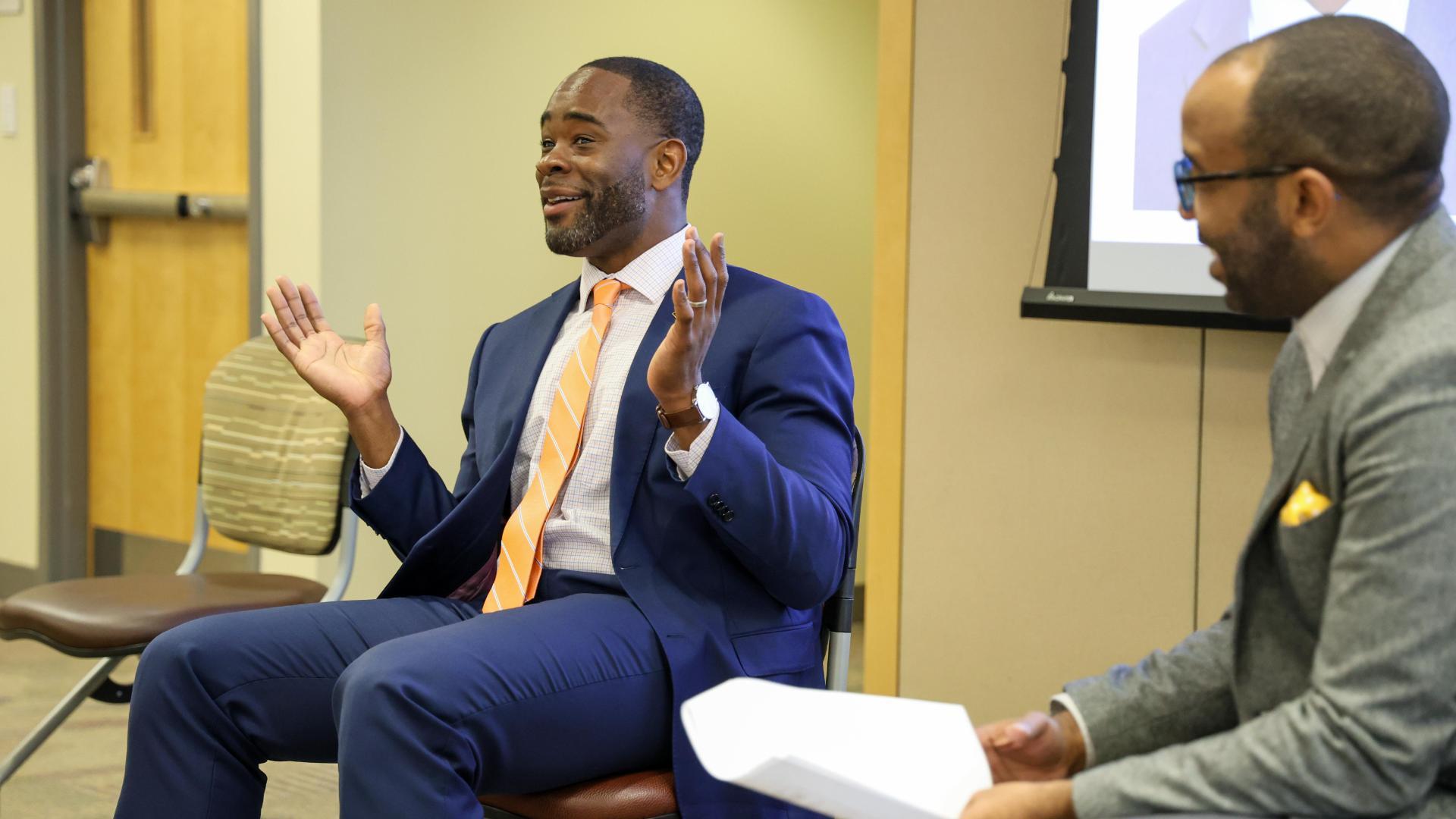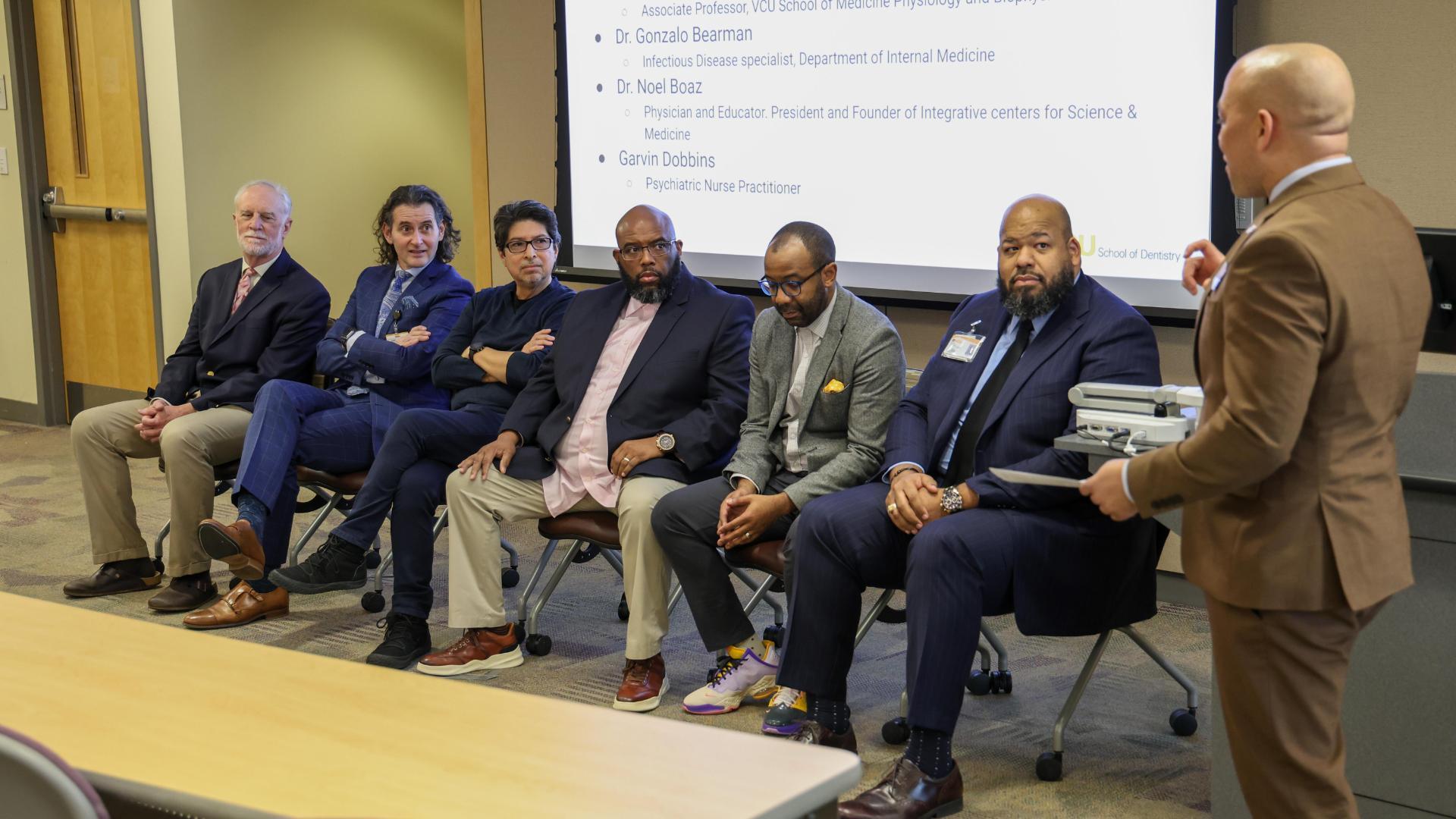 VCU School of Dentistry’s Office of Inclusive Excellence, Ethics and Community Engagement hosted Answering the Call: Thriving as Men of Color in Healthcare, on Thursday, March 28.
VCU School of Dentistry’s Office of Inclusive Excellence, Ethics and Community Engagement hosted Answering the Call: Thriving as Men of Color in Healthcare, on Thursday, March 28. Thriving as Men of Color in Healthcare: Symposium bridges gap for undergraduate students
The VCU School of Dentistry Office of Inclusive Excellence, Ethics and Community Engagement hosted Answering the Call: Thriving as Men of Color in Healthcare on March 28. The half-day symposium served to bridge the gap for undergraduate students to experience the richness and depth of opportunity available to them across the health sciences campus community.
The event was in alignment with national calls from organizations such as the Federation of Associations of Schools of the Health Professions (FASHP), the American Dental Education Association and the Association of Schools and Programs of Public Health who have declared the low number of historically underrepresented men of color graduating and entering the health care professions a national crisis.
The purpose was twofold: to further illuminate the pathway for men of color into the health professions, specifically for our existing VCU undergraduate men of color on the Monroe Park campus, and also to serve as an opportunity for connection, networking and mentorship from and amongst men of color who are professional students, residents, faculty or staff on the Health Sciences Campus.

While it was intended as an event to highlight the unique experiences of men of color in healthcare, all were encouraged and welcome to attend.
The afternoon began with welcoming remarks from VCU School of Dentistry Dean Lyndon Cooper, D.D.S., Ph.D.
“We were proud to host this event at the school of Dentistry, as it directly speaks to a major workforce challenge in healthcare today,” said Dean Cooper. “It was inspiring to see many knowledgeable and dedicated mentors available to undergraduate and professional students as they navigate their individual paths to health care careers.
The event also opened with some staggering statistics from Carlos Smith, D.D.S., M.Div, associate dean for Inclusive Excellence, Ethics, and Community Engagement at the School of Dentistry.
In Dentistry, data revealed that in 2019, only 6.6% of all dental school applicants were historically underrepresented racial and ethnic (HURE) men, representing only 14.5% of all male applicants. In medicine, data has shown that the number of Black men applying to medical school and the number of Black men enrolling in medical school is actually on decline. Currently, practicing pharmacists from HURE backgrounds account for less than 12% of the pharmacy workforce.
“This is important because the science has shown us that racial concordance among providers and patients is a key strategy in combating health inequities and disparities,” said Dr. Smith. ”A Stanford University study paired black men in Oakland, Calif., with either black or non-black doctors. The men seen by black physicians were more likely to engage with them, and even consent to preventive services like cardiovascular screenings and immunizations.”
The study found that Black doctors were more inclined to write detailed notes about their Black patients. Those men who had the least trust in the medical system – and the least exposure to it – benefited the most from racial/ethnic concordance. The study estimates this approach could reduce the Black-white mortality gap due to heart disease by 19%.
A graduate and professional student panel titled "Why now? Why Us? Career Exploration and Impact," included: Terry Everett (M3), Jesse Simpson (D4), Brian Britt (MHA), Jonathan Mack, PT, DPT, (sports physical therapy resident), and Neil Sagrado (Nurse Anesthesia 3).
The panelists offered insights on their career choices, aiming for work-life integration and the importance of mentors.
“I think it's really important to have mentors in different stages of their lives and careers. I’ve also aimed to have a mentor directly ahead of me, maybe another 5-10 years and then another 20 years out. Each is able to provide great insight for the journey ahead,” said Simpson, who was recently accepted into his top choice for an oral and maxillofacial surgery residency at Parkland Memorial Hospital and UT Southwestern School of Medicine.

The panel was followed by a fireside chat with Dean Kelechi C. Ogbonna, Pharm.D., M.S.H.A., from VCU School of Pharmacy, moderated again by Dr. Smith. Dean Ogbonna discussed his journey from collegiate athlete at Fairleigh Dickinson University in New Jersey to earning his Pharm.D. from Massachusetts College of Pharmacy and Health Sciences, followed by residencies in both pharmacy practice and geriatrics at the VA Connecticut Healthcare System.
He described his passion and enthusiasm for community health and offered attendees sage advice on always being prepared and ready to take advantage of each opportunity coming their way.
A second panel of graduate and professional faculty titled, "Thriving, Not Merely Surviving As a Man of Color in Healthcare" was moderated by Stephan Davis, DNP, M.H.S.A., FACHE, associate dean of inclusive excellence and belonging for VCU School of Nursing and the College of Health Professions.
Panelists included Eric B. Freeman, M.D. (pediatrician), Carlos Escalante, Ph.D. (structural biologist), Gonzalo Bearman, M.D. (infectious disease specialist), Noel Boaz, Ph.D., M.D. (physician and educator) and Garvin Dobbins, M.S.N., RN, PMHNP (psychiatric nurse practitioner). Highlights included a focus on strategies for self-care, pathways to various health professions and the need for recognizing when and how to access resources for student success.

“This was a wonderful event focused on addressing a challenge for many of our health professions disciplines — the lack of representation of BIPOC men. It also served as a bridge between our two VCU campuses and helped undergraduate students who were in attendance to better understand the full array of health-related degree options on the VCU Health Sciences Campus,” said Dr. Davis. “I hope this event ignites interest in an ongoing series of conversations focused on the vast opportunities in health and healthcare for men of color at VCU.”
Connection and mentoring were key themes of the afternoon.
“The event was truly amazing. It surrounded students of color around professionals in healthcare at multiple levels. It gave them the ability to ask questions in a safe environment and allow for panelists and participants to give real answers from people who have faced what they are up against,” said Everett, a third year medical student. “Not only was this good for the undergraduate students, but it was a great opportunity for professionals to interact as well. I saw people who I have not seen in years, but have been vital to my success as a black man pursuing medicine. I cannot thank the Inclusive Excellence Office enough for having this event.”
VCU School of Medicine Dean Art Saavedra, M.D., Ph.D., M.B.A., while not in attendance due to prior commitments, expressed his belief in the importance of representation.
“Men of color in healthcare will help us meet the healthcare needs of our communities but will also help mentor the next generation,” said Dean Saavedra. "A gap in our workforce should have never risen to the level of crisis. Now we have an opportunity, indeed a responsibility, to share experiences, identify mutual needs and summon our collective resources to meet this challenge.”
“Not only did the event connect with national health organizations’ priorities regarding workforce diversity and the need for more providers and clinicians of color, it also aligns with VCU’s Quest 2028 Strategic Plan and Provost Fotis Sotiropoulos’s One VCU Academic Repositioning Task Force draft recommendations concerning greater opportunities for undergraduate VCU students who aspire to earn advanced degrees on the VCU Health campus and pursue a career in health care.” said Dr. Smith.
He says the symposium is just a small beginning of the ways in which goals around student success, healthcare workforce diversity, access to care and pathways towards healthcare careers will converge at VCU.
“We look forward to future collaborations, events and programs,” added Dr. Smith.